Chapter 7 - Towards A Zero Waste Nation, Together
Our zero waste vision is an endeavour that will require people in Singapore to come together. From individuals to households and industries, everyone has a part to play as we make our transition towards a Zero Waste Nation.
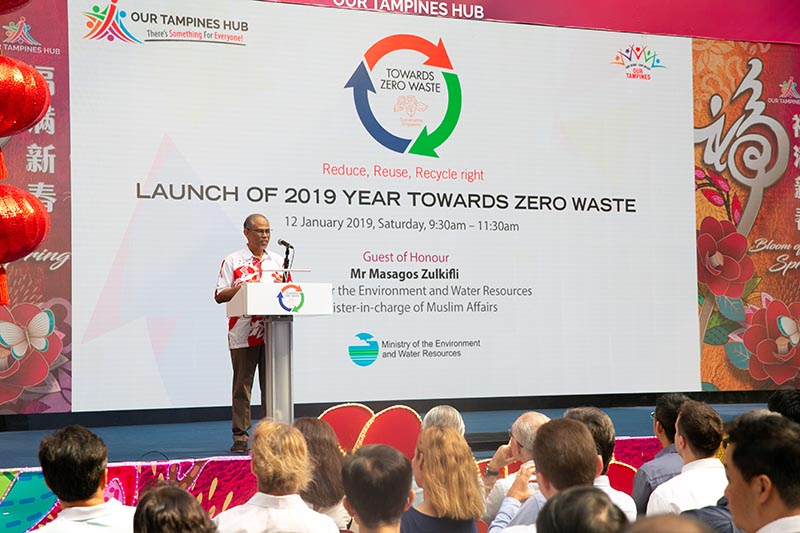 2019 was designated as the Year Towards Zero Waste to rally Singaporeans to care for our environment
and treasure our precious resources
2019 was designated as the Year Towards Zero Waste to rally Singaporeans to care for our environment
and treasure our precious resources
To become a Zero Waste Nation, we need to change the way we live, work and play. This includes curbing excessive consumption habits in all aspects of our lives, harvesting trash for treasure, consciously choosing sustainable products and services, and reusing resources for as long as possible.
The Government has set the direction of this transformation and taken significant steps to chart its course. We have facilitated the setting up of infrastructure to collect, sort and recycle different types of items and materials, and have stepped up education to change attitudes and behaviours towards reducing, reusing and recycling.
But the Government cannot do this alone. We need to partner businesses, individuals and organisations to come up with innovative and effective solutions. Over the years, MSE and the NEA have worked closely with partners to undertake collective action for sustainable development. As we embark on this transformational journey together, we want to uncover broader perspectives, listen to diverse views, and bring together different segments of society to co-create environmental solutions.
CO-CREATING SOLUTIONS WITH SINGAPOREANS
Since 2018, MSE and the NEA have sought the views of the public and other relevant stakeholders on the Zero Waste Masterplan. These stakeholders include:
Industry stakeholders
In 2018, the NEA consulted over 250 companies to gather ideas and views on possible measures to address priority waste streams.
Households
More than 5,000 households were engaged through two door-to-door surveys, conducted between June 2018 and February 2019. One was a biennial survey, which focused on households’ experience with recycling services and infrastructure. The other was commissioned specially for the Year Towards Zero Waste to get a deeper understanding of households’ recycling behaviour.
Non-Governmental Organisations (NGOs)
A dialogue was held with NGOs, youths and other partners in February 2019 to seek their views on MSE’s zero waste plans and to explore collaborations.
General public
More than 1,300 people participated in a public consultation in March 2019 on how Singapore can pursue sustainable consumption and production, and build a strong 3R (reduce, reuse and recycle right) culture. In April 2019, MSE conducted two focus group discussions with 90 participants. The discussions were co-organised with NGOs Zero Waste SG and LepakInSG, and centred on ways to reduce waste and to encourage people to recycle right.
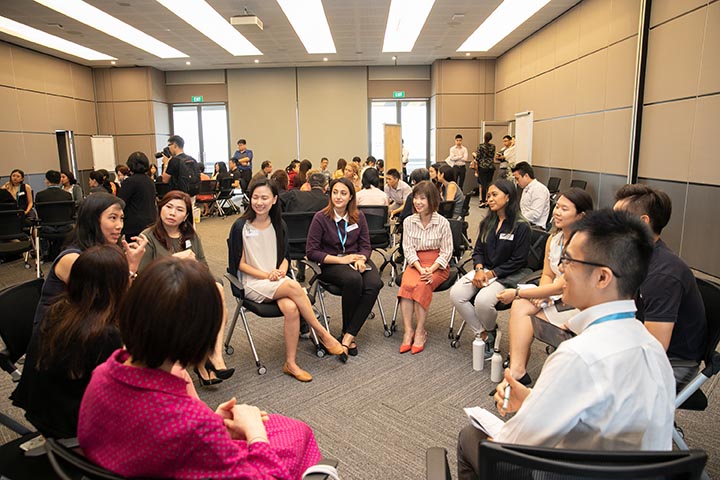 At the focus group discussion on 18 April 2019, participants discussed ways to reduce our consumption of
resources and encourage more to adopt a zero waste mindset
At the focus group discussion on 18 April 2019, participants discussed ways to reduce our consumption of
resources and encourage more to adopt a zero waste mindset
Through the various engagement sessions, we found that people generally agreed that it was important to make the 3Rs a norm in Singapore. Many participants felt that convenience was a key factor in nudging people to put these principles into practice. Many also felt that more education was needed to raise awareness on waste issues, and also called on businesses to promote sustainable consumption.
CATALYSING GROUND-UP INITIATIVES
To effectively promote a zero waste lifestyle, MSE and the NEA work closely with schools, businesses, community groups, NGOs, and civil society groups to rally the ground and raise awareness on waste issues through their networks. Some of these individuals and groups are carrying out research that complement studies by the Government. Others are facilitating dialogues and gathering feedback, and have been galvanising the local community to adopt greener habits.
Here are some initiatives undertaken by our partners:
SEC plastic study and “One Less Plastic” campaign
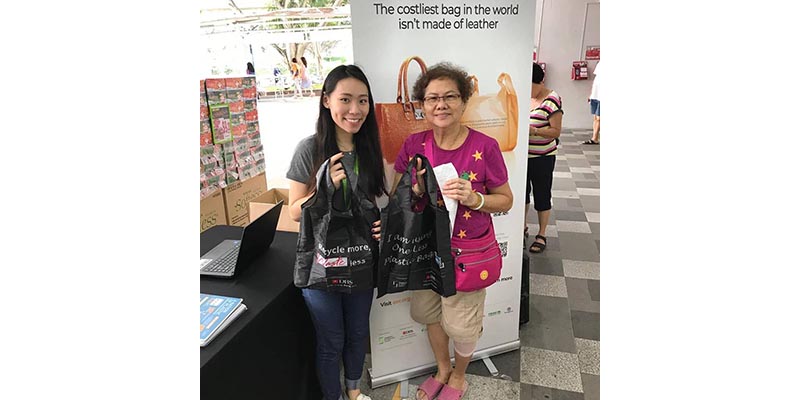 Reusable bags were given out by four supermarket
chains, DBS and SEC as part of the “One Less Plastic”
campaign. Photo: SEC One Less Plastic Campaign
Reusable bags were given out by four supermarket
chains, DBS and SEC as part of the “One Less Plastic”
campaign. Photo: SEC One Less Plastic Campaign
The Singapore Environment Council (SEC) conducted a nine-month study on “Consumer Plastic and Plastic Ecosystem in Singapore”, which focused on three segments of the plastic ecosystem:
- Upstream producers’ responsibilities including packaging
- Consumer lifestyles including recycling behaviour
- Downstream processes including waste management
The study, released in August 2018, found that Singapore uses about 1.76 billion plastic items each year. This prompted SEC to launch a month-long “One Less Plastic” campaign in December that year, to encourage shoppers to swap single-use plastic bags for reusable bags.
Project Recycling
The Climate Action SG Alliance, a group of corporate and civil society leaders, produced a series of videos to educate the public on how to recycle right and to debunk myths surrounding recycling. Three videos – “Breaking Up with Plastic”, “What Can and Cannot be Recycled”, and “Follow the Trash” – were shared on social media channels.
Industry efforts
Getting businesses on board to support Singapore’s drive to reduce waste and operate sustainably is best done by an organisation that understands their needs and constraints.
Since 2001, this role has been played by the Waste Management and Recycling Association of Singapore (WMRAS) – the national trade body for local waste disposal and resource recovery companies.
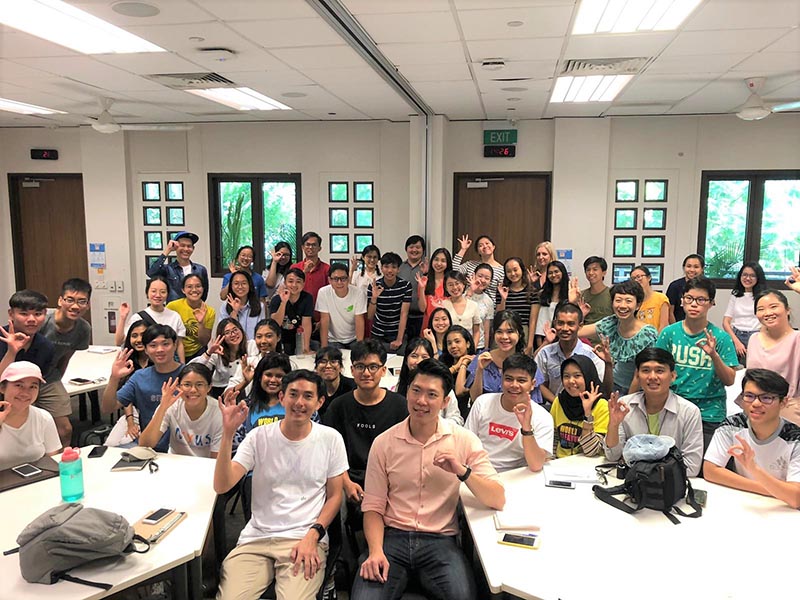 WMRAS conducts regular outreach sessions to educate the
youth about Singapore’s waste ecosystem. Photo: WMRAS
WMRAS conducts regular outreach sessions to educate the
youth about Singapore’s waste ecosystem. Photo: WMRAS
WMRAS and its 160 member companies have been encouraging green practices in the community through talks on waste reduction and recycling. It also holds the biennial WMRAS Excellence Awards to recognise member companies that promote environmental sustainability.
In 2017, WMRAS Academy started a Professional Course in Waste Management and Resource Recovery in collaboration with Australia’s Griffith University for industry workers to learn about sustainability, waste reduction, recycling and the latest environmental technologies.
Schools and youth
Beyond these specific initiatives, MSE and the NEA have been encouraging schools and youths to organise ground-up initiatives to promote environmentally-friendly practices.
Since March 2019, MSE, together with the National Youth Council, has been engaging youth leaders on our environmental policies and programmes. Through their lens, we hope to better understand youth perspectives on sustainability, empower them to lead more ground-up initiatives and to build a more environmentally-conscious and gracious Singapore.
Meanwhile, the NEA works closely with schools to promote active learning and participation in environmental initiatives by providing funding support. The NEA also organises platforms to showcase exemplary student projects and facilitates networking among schools.
For example, as part of the Youth for the Environment Day in April 2019, the NEA launched the Towards Zero Waste Challenge, where schools were encouraged to avoid the use of disposables when organising events. Under the programme, schools received an electronic guide on how to conduct Zero Waste events and other related activities.
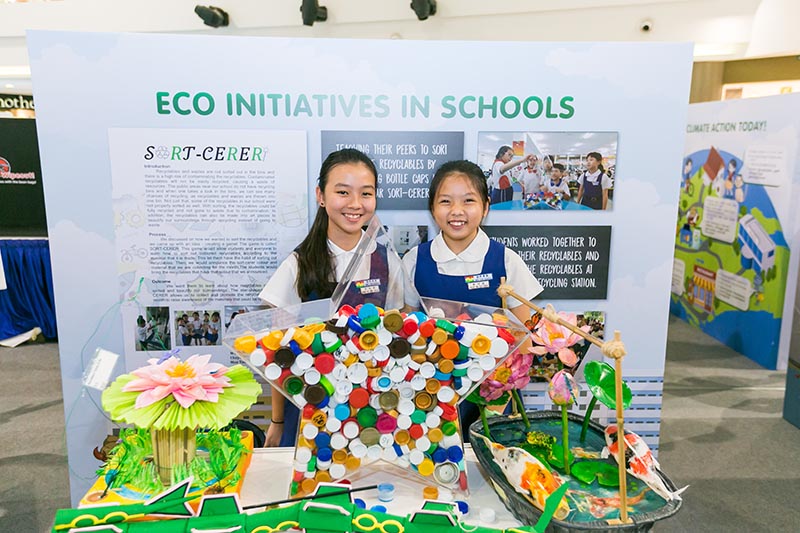 Students from Mee Toh School showcased their
project “The SORT-CERER” at the North East Clean and
Green Singapore 2018. The project aims to encourage
recycling through a simple game and has won the best
project at the North East G!nnovation Challenge 2018
Students from Mee Toh School showcased their
project “The SORT-CERER” at the North East Clean and
Green Singapore 2018. The project aims to encourage
recycling through a simple game and has won the best
project at the North East G!nnovation Challenge 2018
Many schools and Institutes of Higher Learning have also organised their own ground-up initiatives to encourage staff and students to reduce waste. For example, in Bukit View Secondary School’s canteen, no plastic straws are provided and reusable cutleries and containers are made available for staff to pack food. Canteen stall vendors also impose a small charge on disposable packaging to further discourage its use. At the National University of Singapore (NUS), infographics on recycling are set as wallpapers and screensavers on computer screens in the lecture theatres. Other campuswide initiatives at NUS include a 10-cent plastic bag tax, and Bring Your Own (BYO) schemes like Project Box and Project Tumbler that reward patrons for bringing their own reusables for takeaways.
A Towards Zero Waste Grant was set up in 2019 to fund ground-up projects that drive waste reduction and recycling, or encourage households to recycle more and recycle right.
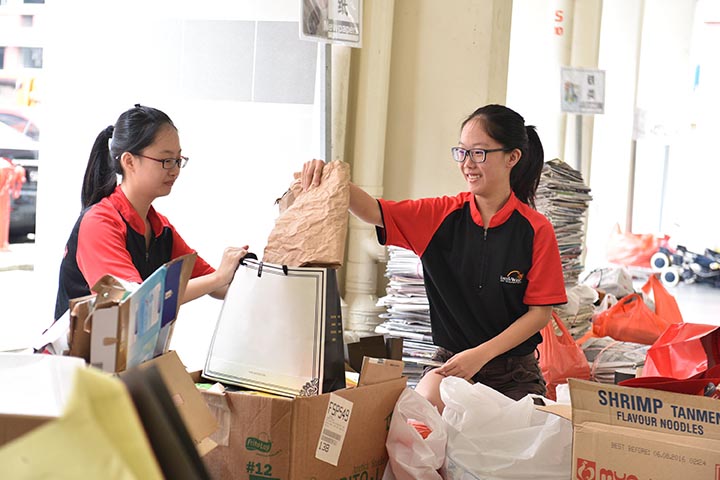 Recycle @ North West, an initiative by the North West
Community Development Council, hopes to drive Active
Recycling through educating residents on proper
recycling techniques and bonding the community
through a common platform to sort recyclables.
Photo: North West Community Development Council
Recycle @ North West, an initiative by the North West
Community Development Council, hopes to drive Active
Recycling through educating residents on proper
recycling techniques and bonding the community
through a common platform to sort recyclables.
Photo: North West Community Development Council
PARTNERSHIPS BEYOND BORDERS
The environmental challenges that we face are not unique to Singapore. Common challenges include a mounting waste problem, greater resource constraints and climate change. We can learn from the experience and expertise of other countries, while sharing ours as well.
Singapore welcomes partnerships with countries and institutions that share the vision of a global circular economy where resources are used efficiently, proper recycling and clean recyclables support economic activity, and innovation and technology push the boundaries of resource recovery.
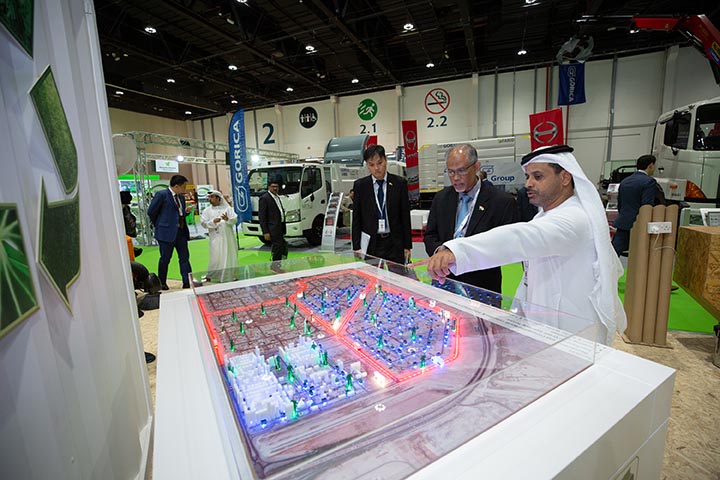 Minister for the Environment and Water Resources, Mr Masagos Zulkifli, visited the Abu Dhabi Waste Management
Center (Tadweer) to learn about Abu Dhabi’s waste management plan and systems, and public outreach efforts
Minister for the Environment and Water Resources, Mr Masagos Zulkifli, visited the Abu Dhabi Waste Management
Center (Tadweer) to learn about Abu Dhabi’s waste management plan and systems, and public outreach efforts
Such partnerships are becoming increasingly important as our world becomes more globalised and interconnected. The movement of materials will inevitably cross national boundaries, and international cooperation is key to leveraging the opportunities from sustainable production, consumption and waste management. As a responsible member of the international community, Singapore will continue to uphold the rules-based approach to addressing environmental challenges and fulfil our international commitments.
This is why we have partnered countries like China, Japan, South Korea, the Netherlands, Oman, Jordan and the United Arab Emirates. We have signed Memorandums of Understanding, engaged them in policy exchanges, and worked together on industry workshops and demonstration projects. Singapore hopes to promote greater collaboration on policies, best practices and technologies to strengthen our capacity to drive the shift towards a Zero Waste future. One example is the Sino-Singapore Tianjin Eco-city (SSTEC), the second Government-to- Government project between Singapore and China. It was designated by China’s Ministry of Environment and Ecology as one of China’s 16 Zero Waste pilot cities/areas in April 2019. Singapore’s contributions enabled SSTEC to meet key environment-related performance indicators on waste reduction and recycling, among others. Having been designated a pilot Zero Waste city, further novel zero waste environmental solutions and initiatives will be explored using a circular economy approach. The aim is to establish a replicable zero waste reference model for other Chinese cities/areas.
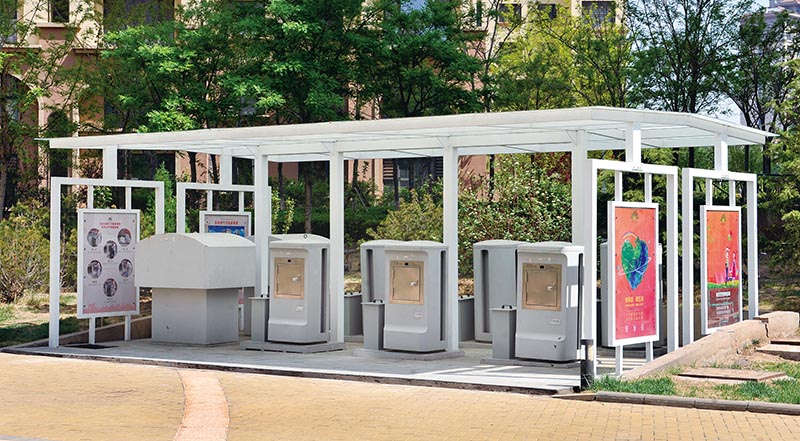 Pneumatic Waste Conveyance System (PWCS) collection bins at a residential development in the SSTEC Photo: Eco-city Administrative Committee
Pneumatic Waste Conveyance System (PWCS) collection bins at a residential development in the SSTEC Photo: Eco-city Administrative Committee
Another good example is the Singapore-Japan E-waste Management Forum organised by the NEA and the Ministry of the Environment of Japan. The forum was held in June 2019 and saw 150 industry leaders and delegates exchange ideas and information on electrical and electronic waste management strategies.
SUSTAINED 3P PARTNERSHIPS
The Year Towards Zero Waste has triggered the momentum for action, and we will continue to build on our partnerships with the 3P (private, public and people) sectors. We believe in expanding our democracy of deeds, where Singaporeans actively contribute and shape our future.
As part of our sustained engagement efforts, MSE is convening a Citizens’ Workgroup to co-create solutions with Singaporeans, to improve the way we recycle at home. One of the key objectives is to reduce the contamination rate of the blue recycling bin, which is currently at 40%. The Citizens’ Workgroup will include Singaporeans from diverse backgrounds. Members will be given access to data as well as subject matter experts who can share their expertise and help with the piloting and implementation of solutions.
We will continue to align our efforts with those of other Government agencies, adopt a sciencebased approach, and work with businesses, international partners, civil society groups and individuals to co-create solutions for a sustainable Singapore.
Together, we can move closer towards our vision of becoming a Zero Waste Nation.
https://www.towardszerowaste.sg/zero-waste-masterplan/chapter7/
